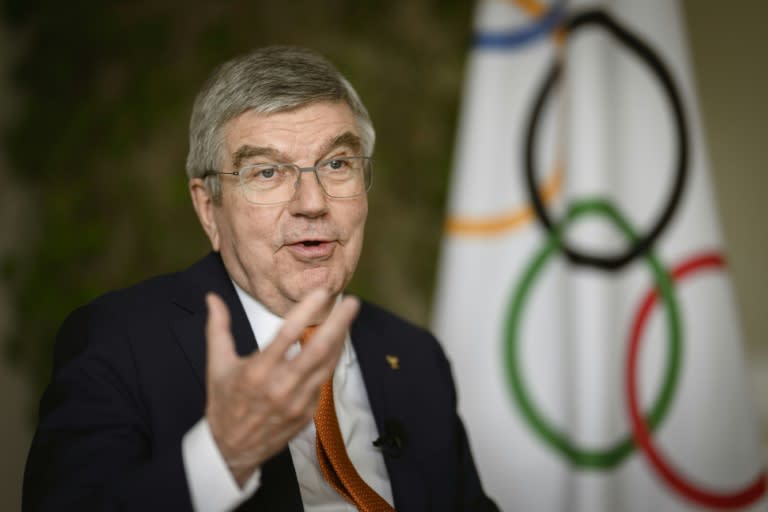Olympic chief Bach backs world doping body over positive Chinese tests

The head of the International Olympic Committee Thomas Bach has backed the World Anti-Doping Agency in a row over its handling of positive drug tests by 23 Chinese swimmers.
"We have full confidence in WADA and the regulations and that WADA have followed their regulations," Bach told AFP in an exclusive interview Friday at the committee's headquarters in Lausanne, Switzerland.
WADA has faced criticism since media reports last weekend revealed that the Chinese swimmers tested positive for heart drug trimetazidine (TMZ) -- which can enhance performance -- ahead of the Tokyo Olympics in 2021.
The swimmers were not suspended or sanctioned after WADA accepted the explanation of Chinese authorities that the results were caused by food contamination at a hotel where they had stayed.
The head of the United States Anti-Doping Agency (USADA), Travis Tygart, has called the situation a "potential cover-up" with the positive tests never made public at the time.
Bach stressed that WADA was run independently, despite being funded by the International Olympic Committee (IOC), and he said he had learned of the positive tests via the media.
The IOC was awaiting the results of a new investigation ordered by WADA on Thursday, but Bach said the Chinese swimmers could compete at the Paris Olympics this year if cleared.
"If the procedures are followed, there is no reason for them not to be there," the 70-year-old former German fencer added.
- 'Iconic' Paris -
The Paris Games are set to be important to "revive the Olympic spirit" after the last Covid-affected edition in Tokyo in 2021 saw sport play out in empty stadiums, Bach said.
The hugely ambitious opening ceremony being planned by French organisers remains one of the biggest doubts, with infrastructure for the Games either already built or on track.
Instead of a traditional parade through the athletics stadium on the first night, teams are set to sail down the Seine on a flotilla of river boats in front of up to 500,000 spectators.
Worries about a terror attack have led to persistent speculation that the ceremony might need to be scrapped or scaled back dramatically.
"The very meticulous, very professional approach (from French authorities) gives us all the confidence that we can have this opening ceremony on the river Seine and that this opening ceremony will be iconic, will be unforgettable for the athletes, and everybody will be safe and secure," Bach said.
Recent grumbling from Paris residents and negative media reports were typical of the run-up to any Olympics, he said, and also a symptom of broader anxiety.
"It's part of our zeitgeist because we are living in uncertain times. And there are people who are sceptical. Some are even scared. Some are worried about their future," the IOC president said.
- Diplomatic tightrope -
As with previous Olympics, international politics and diplomacy are set to intrude on the world's biggest sporting event.
Bach reinterated his support for the IOC's policy of excluding Russia from the Paris Games over the "blatant violation" of the Olympic charter when it annexed Ukrainian sporting organisations.
A small number of Russian athletes will be able to compete as neutrals in Paris, providing they have not declared public support for the invasion of Ukraine or are associated with the security forces.
Any Russian athlete that expressed political views on the field of play, including the "Z" sign that has come to symbolise Russian President Vladimir Putin's war, could be excluded.
"Immediately a disciplinary procedure would be opened and the necessary measures and or sanctions be taken," Bach said, adding: "This can go up to immediate exclusion from the Games."
Addressing Israel's military campaign in Gaza, he said between six and eight Palestinian athletes were expected to compete in Paris, with some set to be invited by the IOC even if they fail to qualify.
Bach dismissed any suggestion that the IOC had treated Russia differently over its invasion of Ukraine compared with Israel and its war in Gaza.
"The situation between Israel and Palestine is completely different," he said.
He said he had been even-handed in his public statements on Ukraine, the Hamas attack on Israel on October 7 and the subsequent Israeli invasion of Gaza.
"From day one, we expressed how horrified we were, first on the seventh of October and then about the war and its horrifying consequences," Bach said.
Palestinian militants from Hamas attacked Israel on October 7, resulting in the deaths of about 1,170 people, according to an AFP tally of Israeli official figures.
Israel's retaliatory military campaign to destroy Hamas has killed 34,356 people, mostly women and children, according to the health ministry in Hamas-run Gaza.
Bach is in the last year of what should be a second and final four-year term according to IOC rules.
But some IOC members have suggested changing the organisation's statutes to enable him to stay at the helm -- an issue he declined to address.
"The IOC Ethics Commission has given me the strict recommendation not to address this question before the end of (the) Paris (Olympics) and I think they have good reasons for this," he said.
adp-cfe/gj

